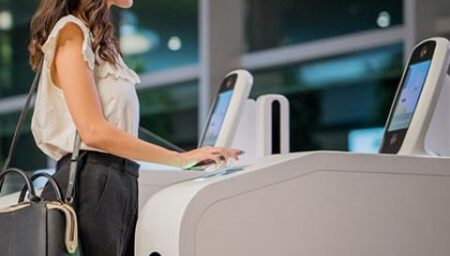Facilitating airport passengers’ journeys

In our globalized, connected world, we are in constant motion. This new landscape demands a sustainable, convenient, secure identity that is as “on the move” as we are.
What does identity look like in this new world? Fundamentally, identity is what anchors an individual to society but as we now live in a globalized, connected world, we expect an identity that follows us wherever we are on the planet and that lets us travel, consume and exist anywhere in the world. We want our identity to keep up with our on-the-go digital lifestyle. However, these expectations are giving way to new challenges, namely convenience, security and privacy. Today, we are in the midst of an identity revolution – fueled by three major game changers: biometrics, digitalization and interoperability.
The most impressive real world example of biometric usage is the Aadhaar project in India. This ambitious project kicked off with the goal of providing an identity to all citizens in the country, in the form of a 12-digit number linked to their biometric data – giving way to a new paperless generation and simplifying access to a number of essential services such as social benefits, education, healthcare, financial or telecom services. More generally, with the three leading forms of biometrics – fingerprint, face and iris – we can effortlessly board a plane, enter a secured building or pay for our groceries in seconds in many places in the world. Biometrics allow us to move around faster, easier and more securely than ever. While we cannot overlook fraudsters’ attempts to impersonate other people, have no fear! Highly advanced fingerprint scanners detect falsified fingerprints and facial scanners feature a liveness detection element to ensure that the person in front of the camera is in fact a real person.
Anyone who has ever forgotten their wallet has yearned for – whether they knew it or not – the second game changer: digitalization. In parts of the world, individuals are already going completely wallet-less – identifying and paying via mobile devices. In the U.S., mobile driver’s license holders in Oklahoma or Delaware can already experience the benefits of having a mobile ID for in-person identity proofing. They are able to share only the information necessary for the transaction they want to conduct, proving they are 21+ without disclosing their actual date of birth, for example. It also provides a direct line of communication from their Motor Vehicle Administration (MVA), which can update their information without requiring an in-person visit.
While digitalization presents huge benefits in terms of convenience and efficiency for citizens as well as public and private parties, it raises new concerns around security and privacy. Dematerialized identities stored in databases demand a higher level of security, as fraud can happen on a much larger scale. From a privacy perspective, dematerialization presents the advantage of giving individuals full control over how their identity information is used, but also requires “all knowing” databases storing identities of countless people. Ensuring that convenience doesn’t come at the cost of privacy is essential. It means creating firewalls in identity systems that authenticate individuals, yet do so with full anonymity.
Interoperability means that a person’s identity – be it physical, or digital – can be used anywhere, regardless of the system, or even the country. Full interoperability will facilitate and secure cross-border use of online services between individuals, businesses and public authorities with identity systems of collaborating states speaking the same language. For instance, this will allow a citizen of a given country to buy a home, rent an apartment or open a bank account, remotely from his home country, only using electronic identification and digital document signatures. On a smaller scale, imagine that you’re shopping online but you’ve just moved. In an interoperable world, you will only need to register your new address one single time with a central, ironclad database. You can then grant access to a specific website or company for a specified amount of time. A single, fully interoperable database ensures that data is used properly by approved parties and gives individuals the option to revoke these rights at any time.
Identity on the move – fueled by biometrics, digitalization and interoperability – is the future of identity, as long as the advancements and technology that simplify our lives also prioritize our privacy and security.

Related Content